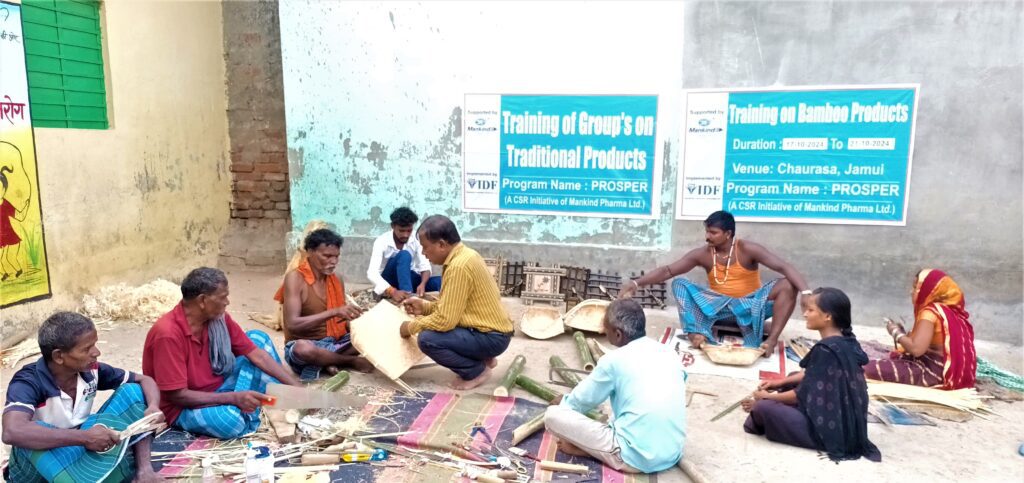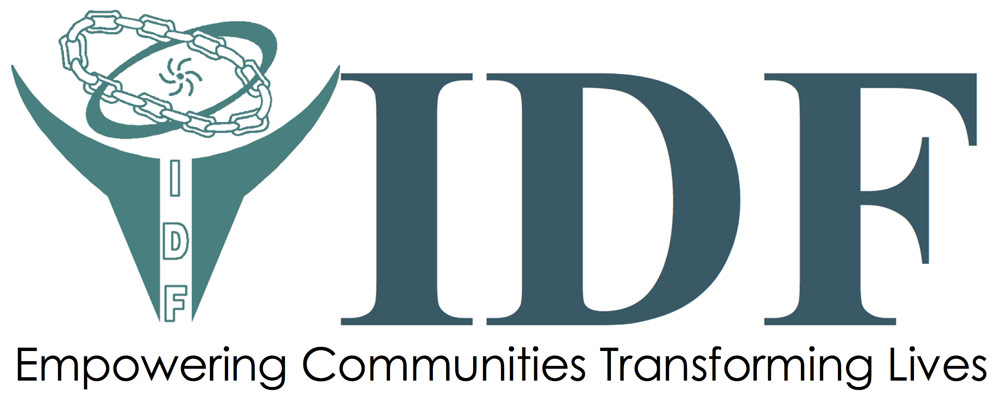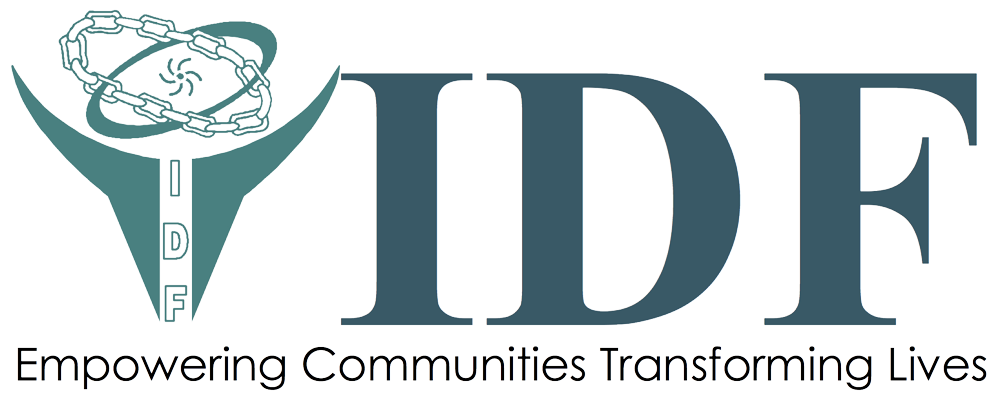PROSPER Project
Project : PROSPER
Donor : Mankind Pharma
Location : Sheikhpura, Nawada and Jamui Districts of Bihar
Outreach : The project aims to directly benefit a population of 26,598 from 3,722 households across 15 villages in three blocks of three districts of Bihar, focusing on the deprived sections of society.
Project Brief :
IDF with the support of Mankind Pharma is implementing a Promoting Rural Opportunities & Solutions for Prosperty, Enrichment & Raise (PROSPER) program in 15 selected villages of sheikhpura, Nawada and Jamui district and has made a positive contribution to the development of the target community.
The Program enhance rural livelihoods through microenterprise development and skill training. It improves education through school renovations and smart classrooms. The project boosts healthcare services through awareness programs and health check-ups. It ensures safe drinking water and sanitation, upgrades Anganwadi Centers, promotes solar energy, and offer financial literacy programs.
Formation of Community Institutions at village level: Village Kind Committees (VKCs) will be created as voluntary associations for local administration, representing all community sections. VKCs will be formed in 15 villages in the first year and will support and advocate development work.
Role of village Institution:
- Planning of village development activities.
- Ensuring that the majority of the benefits accrue to the marginalized groups and ultra- poor households in the community.
Area of Intervention
- Livelihood Enhancement
- Goat Rearing: Goat farming, crucial for rural livelihoods in India, Faces Challenges like poor breed management and high infertility. The Integrated Development Foundation (IDF) aims to address these issues by promoting goat value chains with 1000 families across 15 villages, improving breed quality, health and market linkages, and training women farmers to enhance livelihoods and reduce poverty.
- Poultry Farming with SHG: Poultry meat is a key protein source, with broilers offering quick growth and high feed efficiency. Promoting poultry farm enterprises among women’s SHG can generate income, with 5 units in three districts, involving 8-10 members each, receiving technical training and support.
- Mushroom Farming: Mushroom production, suitable for landless and marginal farmers, women SHG members can cultivate mushrooms, which require minimal space and organic matter, without disrupting household chores. Promoted varieties include Button, Rajendra White Milky, and Oyster, enhancing socio- economic conditions and entrepreneurship skills.
- Backyard Poultry with ultra-poor household: In a bid to uplift 300 struggling families, we’ve introduced backyard poultry farming. Through locally available resources, we’re creating a model of development that promotes self- reliance and environmental sustainability.
- Skill Centre on stitching for Adolescents and Women: Establishing tailoring skill centers empowers women and adolescent girls to earn income from home while maintaining traditional roles. Three centers across 15 villages in three districts will often training, facilitated by dedicated trainers with the necessary resources. Supporting these centers is crucial for sustainable community development.
- Support to Individuals to start and improve their business:Supporting individuals in starting and enhancing businesses fosters economic growth and entrepreneurship. Providing resources like funding, mentorship, training, and networks helps aspiring entrepreneurs realize their vision, create jobs, and drive innovation. This promotes self- reliance and resilience, strengthening local economies and communities. IDF will support 75 ultra-poor families.
- Natural Resource Management
- Solar Based Group Irrigation System: Time-bound irrigation boosts land fertility and yield, but high costs limit access for many farmers. This project will install eight solar irrigation units in water-scarce villages, benefiting 200 farmers and covering 200 acres. Farmers will select sites and lease land for group systems, reducing irrigation costs by 50%, increasing crop intensity, and promotion horticulture.
- Solar based Jal Meenar: Solar based jal meenar systems ensure reliable access to safe drinking water for marginalized communities, reducing waterborne diseases and providing round-the-clock supply during water-scarce seasons. IDF will construst 5 Jal Meenar in five villages, these systems benefit at least 300 households across five villages.
- Solar operated street Lights: Solar lighting provides a sustainable alternative to traditional grid lightining, ensuring reliable operation during blackouts and eliminating electricity costs. In the proposed villages, 180 solar-powered street lamps will be installed in 15 villages at strategic locations to improve safety, especially for women and girls. Agriculture & Allied Activities.
- Fisheries and vegetable Farming in alignment with SBGI Units: Our approach to sustainable development harmonizes fisheries and vegetable farming with solar-powered group irrigation systems. This integrated model not only enhances productivity but also reduces environmental impact, contributing to Nutritional security, Health & Hygiene support to Adolescents: long- term resilience and prosperity in our communities.
- Orchards Development with Small Farmers: Horticulture activites pave the way for the integration of subsistence farmers and resource-poor people into broader economic activities, sustaining rural communities and improving living conditions. The orchard development initiative aims to strengthen marginal farmer’s livelihoods. IDF will develop 10 orchards in the first year and involve 20 more farmers over two years.
- Setting up of Tool Bank: A Tool Bank will be established in 12 villages to provide farmers with access to modern farming equipment, addressing labor shortages and improving agricultural efficiency.
- Quality Education
- Installation of Smart Class in Govt. schools: Smart classes are a modernized method of education in the Indian education scenario which provides quality education to students by helping them in better concept formation, student- centered learning environment, and replacing traditional blackboard methods. Smart classes will be set up in six schools across three districts, benefiting 1500 children.
- Creating Smart School: The organization plans to transform six government schools across three districts into smart schools with improved facilities and infrastructure. This includes renovations, beautification, minor repairs, plumbing, painting, toilet complex renovations, drinking water facilities, activity corners, seating arrangements, science laboratories, and libraries.
- Renovation & Beautification of Aganwadi Centers: To enhance learning practices, 12 centers will undergo renovation and beautification, including teaching aids, painting, drinking water filters, and seating arrangements. This will create a child- friendly environment, benefiting 500 children aged 3-6 over three years.
- Health
- Conducting Health Camps at Village level: Health camps will be organized in 15 villages to provide free check-ups and treatment for the underprivileged. These camps will offer comprehensive physical examinations, including checks on eyes, heart, lungs, digestive system, liver, kidneys and immune system. Over three years, 45 health camps will be held, aiding disease prevention and planning.
- Celebrating and supporting village health and Nutrition Day: Village Health and Nutrition Days (NHND) aim to improve maternal and child health by increasing early registrations, ANS check-ups, and counselling on various health topics. The initiative will support 60 VHND yearly, covering 100% of lactating women and children up to 6 years for health check-uos and immunizations.
- Nutritional security, Health & Hygiene support to Adolescents: Providing sanitary napkin to adolescent girls promotes menstrual hygiene, support continued education, and ensures well-being. This initiative addresses challenges in accessing affordable, hygiene menstrual products, mitigating health risks, and preventing school absenteeism. IDF will distribute 10,800 units of sanitary napkins to adolescent girls in the next three years.


